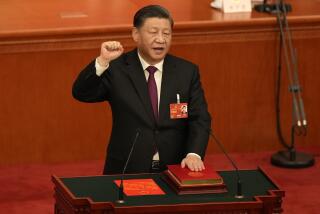China’s New Leaders Get a Blessing From Deng : Politics: Appearing frail, the 88-year-old architect of reform poses for photos. He pronounces party congress ‘a great success.’
- Share via
BEIJING — Senior leader Deng Xiaoping emerged into public view Monday to savor a moment of political triumph and endorse a successor generation of leaders committed to his vision of how to modernize China.
Deng, 88, the architect of China’s 14-year-old economic reform program, posed for pictures in the Great Hall of the People with the 2,000 delegates to the Communist Party’s 14th National Congress, which concluded Sunday.
“The congress was a great success,” Deng told Communist Party General Secretary Jiang Zemin, according to the official New China News Agency.
Still China’s most influential leader, Deng appeared weak and frail in an evening television news report of the event. His left hand shook and his eyes remained fixed forward, as if not always focusing on the scene around him. He walked with a daughter, Deng Rong, grasping one arm from behind.
Deng was accompanied by several aging revolutionary colleagues as well as the seven members of a newly elected Politburo Standing Committee that forms the heart of a successor generation of leadership.
A new 189-member Central Committee that was approved Sunday by the congress elected a new 20-member Politburo on Monday morning. The Politburo Standing Committee members then appeared briefly before Chinese and foreign journalists. Jiang formally introduced the other members of the Standing Committee, but no one made any policy statements or answered any questions.
The gathering contrasted sharply with an event five years ago, after the party’s 13th congress, when then-General Secretary Zhao Ziyang led the Standing Committee in meeting the press. Zhao, appearing immensely confident, fielded questions for an hour, while the other members chatted quietly with journalists in what was almost a cocktail party atmosphere.
Monday’s restricted arrangements reflected the continuing effects of the 1989 massacre that ended the Tian An Men Square pro-democracy movement. Ever since, China’s top leaders and the foreign press corps have had a tense relationship bordering at times on mutual contempt. Journalists ask tough questions about the massacre and political repression whenever they get a chance. The government, for its part, has progressively cut off media access to Politburo-level officials.
Jiang spoke very briefly to journalists Monday, noting that he had delivered a speech at the just-completed congress and that various officials had conducted press conferences during the congress.
“All that I wanted to say has already been said by them,” Jiang said. He ignored shouted questions as he led the committee out of the room.
The new Standing Committee consists of four continuing members and three new ones. Retaining their positions are Jiang, 66; Premier Li Peng, 63; Qiao Shi, 68, head of China’s security apparatus, and Li Ruihuan, 58, a reformist with increasing responsibility for ideology. New members are Vice Premier Zhu Rongji, 64; Liu Huaqing, 76, an army general who is vice chairman of the Central Military Commission, and Hu Jintao, 49, a former Communist Party boss in Tibet.
Of the seven, Premier Li is the one most associated with the party’s more hard-line faction, while Li Ruihuan and Zhu are generally considered the most liberal members.
Liu is known for his devotion to military modernization. Hu had close ties to the late reformist leader Hu Yaobang. Jiang was an emergency choice to replace Zhao after he was ousted in 1989 for allegedly supporting the pro-democracy protests.
All seven support the twin pillars of Deng’s basic policies: market-oriented economic reforms and opening up to the outside world paired with an unyielding Communist Party dictatorship. Differences among them relate primarily to the degree of emphasis placed on these sometimes-conflicting goals.
The New China News Agency report on Deng’s meeting with congress delegates listed China’s top leaders--at least those still physically capable of making public appearances--in what appeared to be the new official order of prestige: Deng; Jiang; President Yang Shangkun, 85; Li Peng; National People’s Congress Chairman Wan Li, 75; Qiao; Vice Premier Yao Yilin, 75; outgoing Politburo Standing Committee member Song Ping, 75; Li Ruihuan; Zhu; Liu, Hu and revolutionary elders Bo Yibo, 84, and Song Renqiong, 83.
Yang, Wan and Yao are expected to step down from their government positions next year, joining Deng, Song Ping, Bo and Song Renqiong in a small group of key elders who exercise influence through prestige and connections rather than formal position.
More to Read
Sign up for Essential California
The most important California stories and recommendations in your inbox every morning.
You may occasionally receive promotional content from the Los Angeles Times.










